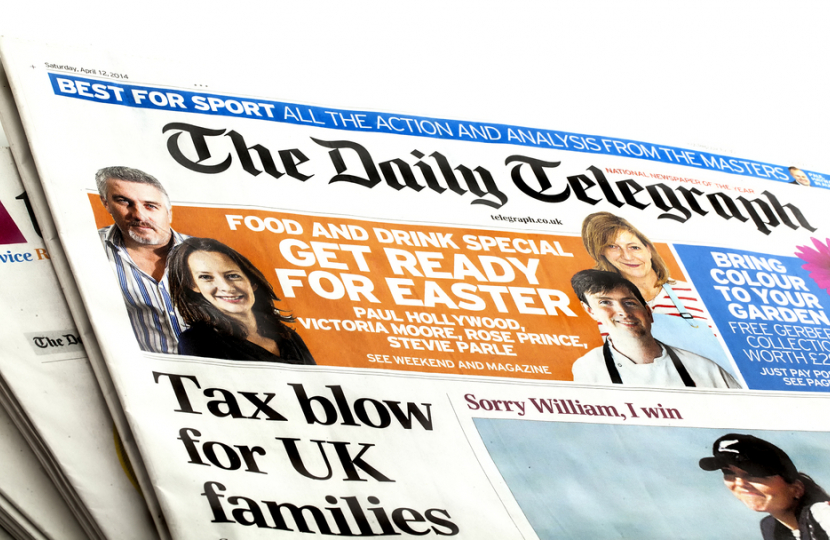
The free press lies at the heart of our democracy, and we cannot permit that to be undermined.
The idea that The Telegraph could be taken over by an investment fund backed by a foreign state will strike any believer in a free press as utterly wrong.
It doesn’t matter if you are on the Left or the Right of politics, the importance of safeguarding press freedom still applies.
That is why I am relieved that the Culture Secretary, Lucy Frazer, has decided to call in the proposed takeover of The Telegraph by the Abu Dhabi-backed RedBird IMI, using the little-known mechanism of a Public Interest Intervention Notice (PIIN).
If the takeover had gone ahead – in what seemed to many to be unseemly haste – the ultimate owner of The Telegraph could now already be Sheikh Mansour bin Zayed al-Nahyan, a prominent member of the ruling family of Abu Dhabi, part of the UAE. He is the same man who owns Manchester City.
Some have said that his involvement with that club amounts to “sportswashing”, an attempt to use massive investment in football to distract from the truth about the UAE, an authoritarian regime accused of egregious human rights abuses.
But even if you are all in favour of the nation’s top sports clubs going to the highest bidder, we are not talking in this case about just another hugely wealthy football team. No, if this takeover goes ahead, it will result in a highly significant part of Britain’s free press – whose role is to hold governments to account, even when it is unfashionable to do so – effectively being owned by a regime whose record on free expression is highly concerning.
As a result of the Culture Secretary issuing the PIIN, the regulator Ofcom will examine the bid on the basis of whether it will leave The Telegraph free to accurately present the news and be unshackled in its ability to express opinion. Meanwhile, the Competition and Markets Authority will examine the deal for any potential competition issues.
But the investigation cannot be conducted on those grounds alone. The inquiry should also bring in the intelligence services to advise on what the wider risks could be in allowing a link-up between a British media group and a foreign state. What Abu Dhabi’s purposes are in seeking to acquire a British media company need to be fully understood in the context of the geopolitical situation today.
In particular, it is vital to know what other links Abu Dhabi may have to powers or organisations that may wish us harm. The Middle East is currently in a state of flux. Iran is hard at work in the region – supported by China and Russia – in building a new authoritarian axis, and the spread of its influence is concerning. The oil-rich nations of the Gulf also appear to have shifted away from the Western alliance, particularly in their attitudes towards Moscow and Beijing.
When in the United States recently, I discussed The Telegraph’s potential takeover with some American politicians and think-tankers. They were in full agreement that a government, even a benign one, should never be allowed to take control of a newspaper – regardless of the promises it might make on protecting that newspaper’s editorial independence.
They are right, of course. The overriding principle should stand that no foreign government should be able to own British media.
Our newspapers are vital to our political discourse. Although print readership might be in decline, growing numbers of people read them online – seeking trustworthy reporting of the news.
They are also increasingly important given the worrying spread of fake news on X (formerly Twitter) or on the Chinese-government-influenced TikTok. Proper journalism produced by proper papers like The Telegraph has never been needed more than it is today, to counteract the shallow, instantaneous culture of the social media world.
You may be on the Left, you may be on the Right or you may consider yourself to be generally unpolitical. But what must bind us all together is a shared belief that a free press lies at the heart of a genuine democracy.



